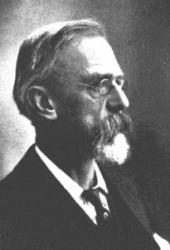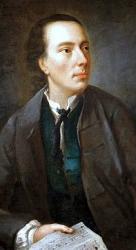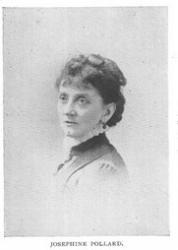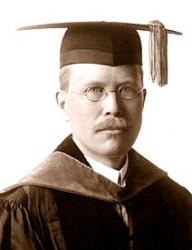Planning worship?
Check out our sister site, ZeteoSearch.org,
for 20+ additional resources related to your search.
- |
User Links
Person Results
‹ Return to hymnal





Export as CSV
William S. Bambridge

1842 - 1923 Person Name: W. S. Bambridge Hymnal Number: 52 Composer of "[Alleluia! Alleluia!]" in Songs for Sunday Schools
William S. Bambridge
W. S. Hoyte
1844 - 1917 Hymnal Number: 137 Composer of "[Jesus, from Thy throne on high]" in Songs for Sunday Schools Born: September 22, 1844, Sidmouth, England.
Died: July 2, 1917.
Buried: Sidmouth, England.
Hoyte studied under John Goss and George Cooper. He played the organ at various locations, finally at All Saints, Margaret Street, London (1868-1907). He was also a professor of organ at the Royal College of Music (1888), and at the Royal Academy of Music (1893), and professor of the pianoforte at the Guildhall School. He was a member of the Philharmonic Society, and received his DMus degree from the Archbishop of Canterbury in 1904.
--www.hymntime.com/tch
W. S. Hoyte
Charles Avison

1709 - 1770 Person Name: C. Avison Hymnal Number: 38 Composer of "[Zion, the marvelous story be telling]" in Songs for Sunday Schools Born in Newcastle-upon-Tyne, studied music in Italy, then served as organist of St. Nicholas' in Newcastle. He was respected both for his instrumental compositions and arrangements, and his writings on musical aesthetics. The hymn tunes attributed to him are adaptations.
--John Julian, Dictionary of Hymnology (1907)
Charles Avison
Josephine Pollard

1834 - 1892 Person Name: Josepine Pollard Hymnal Number: 60 Author of "Joy-bells" in Songs for Sunday Schools Josephine Pollard USA 1834-1892. Born at NYC, NY, one of seven children and daughter of an architect, she attended an exclusive girls school, Spingler Institute, and was a lifelong member of the Presbyterian Church. She was a founding member of the professional women’s club, Sorosis. She never married. She became an author, poet, and hymnist, writing many children’s books and for children’s magazines, including Harper’s, Scribner’s, and the New York Ledger. She wrote 44 books, mostly religious, for children, but also about history, birds, sports and games, and adventure stories. She also wrote 100+ hymn lyrics as well. She worked as an editor for the Sunday School Times and for the Methodist Book Concern, where she edited a magazine for African Americans. Her children’s books include: “History of the U.S.” (1884); “The life of George Washington” ; “The life of Christ for young people”; “History of the New Testament in words of one syllable” (1899); “History of the Old Testament in words of one syllable” (1899); “Bible stories for children” (1899). She was in poor health in her latter years. She died at NYC, NY.
John Perry
===============
Pollard, Josephine, born in New York, circa 1840, is the author of (1) "I stood outside the gate" (Lent), (2) "Joy-bells ringing, Children singing" (Joy) in I. D. Sankey's Sacred Songs and Solos, 1878.
--John Julian, Dictionary of Hymnology, Appendix, Part II (1907)
Josephine Pollard
Lindsay B. Longacre

1870 - 1952 Person Name: Rev. L. B. Longacre Hymnal Number: 113 Composer of "[God bless our native land]" in Songs for Sunday Schools Lindsay Bartholomew Longacre was born in Pottsville, Pennsylvania, on January 26, 1870, the son of Orleans and Rachel (Bartholomew) Longacre. Longacre wanted to become a musician, but pursuant to his father’s wishes, he attended the Columbia University School of Mines and was graduated from there with a degree in mining engineering in 1892. Following a call to the ministry, he attended Drew Theological Seminary, where he received a B.D. degree in 1896, and was subsequently ordained a minister in the Methodist Church that same year.
From 1896-1910, Rev. Longacre served several small churches in the New York Conference.
These included Glenville, St. Luck, Madison Avenue (later called Christ Methodist after a move to a new location), Fifty-Sixth Street Church, Morris Heights, and Woodlawn Heights. His pastorate at Madison Avenue Church was as the Assistant Pastor to Andrew Longacre, his uncle.
In 1910, Dr. Longacre was appointed head of the Department of Old Testament Literature and Religion of the Iliff School of Theology. He held that position for 32 years. On several occasions during his tenure at Iliff, Dr. Longacre also acted as president of the school. He authored four books, a number of articles, and church school curriculum. His books are: A Prophet of the Spirit: A Sketch of the Character and Work of Jeremiah (1917 and 1922); Amos, Prophet of a New Order (1921; translated into Burmese in 1939); Deuteronomy, A Prophetic Lawbook (1924); and The Old Testament: Its Form and Purpose (1945). He was invited to submit three articles to the Abingdon Bible Commentary(1929). These articles are entitled “The Bible as Literature,” Numbers,” and “Joshua.” Dr. Longacre also held membership in the National Association of Biblical Instructors and the Society of Biblical Literature and Exegesis.
During his tenure at Iliff, Dr. Longacre was involved in a controversy known as the “fundamentalist-modernist controversy.” This controversy, which reached its height in the 1920s, grew out of reactions to the liberal approach that the school had taken toward religion and education. These reactions, from both inside and outside the Methodist Church, were in response to the school’s use of higher criticism in the teaching of Biblical studies.
While at Iliff, Dr. Longacre also taught courses in preaching, worship, and hymnology. He had nurtured his love for music as an avocation, and wrote many hymns and songs. Some of these hymns were published in The Riverdale Hymn Book (1912), The Methodist Hymnal (1935), The Hymnal (Evangelical and Reformed Church) (1941), and The Story of Our Hymns: The Handbook to the Hymnal of the Evangelical and Reformed Church (1952). He believed that great hymns were “God-centered.” In addition to composing music, he wrote explanatory notes for various Denver Symphony programs, and had a special love for opera. He also held membership in the Hymn Society of America, the American Guild of Organists, and the Quill Club of New York.
In his courses on worship, Dr. Longacre expected no loess that excellence from his students in planning and leading services. He felt that worship should be be “truly theocentric.” Because of his interests in music and worship, he served on the Commission on Ritual and Orders of Worship of the Methodist Church from 1940-44. The Commission produced a new Book of Worship for Church and Home. Dr. Longacre contributed introductory sentences to accompany selected readings in two sections: “Scriptures for Reading and Meditation” and “Daily Readings and Prayers for a Month.”
Dr. Longacre retired from Iliff in 1942. He and Florence Biggart Longacre, his second wife of six years, then made a brief move to California. (His first wife, Arabella Hyland Longacre, had passed away in 1930.) After returning to Denver, he played a leading role in the 1944 University of Denver production of Thornton Wilder’s Our Town. It was his first acting experience. That same year, the Longacre’s returned to New York City to pursue his interest in music and the arts through the cultural activities of the city. From 1947-1952, Dr. Longacre served as the Assistant Pastor to the Rev. Ralph W. Sockman of Christ Methodist Church.
Dr. Lindsay B. Longacre died at the age of 82 years on September 18, 1952, after a long and distinguished career of service to the church and humanity.
© 2002. Marshall Eidson
http://www.iliff.edu/research/archives/longacre/bio.htm
Lindsay B. Longacre
Charles Vincent
1852 - 1934 Hymnal Number: 60 Composer of "[Joybells ringing, Children singing]" in Songs for Sunday Schools Vincent, Charles; b. 9-19-1852, Houghton-le-Spring, Durham, d. 2-28-34, Monte Carlo; English organist. Full name Charles John Vincent, Jr.
Charles Vincent
Thomas MacKellar

1812 - 1899 Hymnal Number: 25 Author of "The Holy Bible" in Songs for Sunday Schools Mackellar, Thomas, was born in New York, Aug. 12, 1812. At the age of 14 he entered the printing establishment of Harper Brothers. In 1833 he removed to Philadelphia and joined the type-foundry firm of Johnson & Smith, as proof reader. He subsequently became a foreman, and then a partner in that firm, which has been known from 1860 as Mackellar, Smiths, and Jordan, type-founders of Philadelphia. His publications include The American Printer, 1866, a prose work, and the following in verse:—
(1) Droppings from the Heart, 1844; (2) Tam's Fortnight Ramble, 1847; (3) Lines for the Gentle and Loving, 1853; (4) Rhymes Atween Times, 1872. The last contains some of his hymns. (5) Hymns and a few Metrical Psalms, Phila. 1883 (71 hymns, 3 psalms), 2nd edition, 1887 (84 hymns, 3 psalms).
Those of his hymns in common use include :—
1. At the door of mercy sighing. Lent. Published in his Rhymes Atween Times, 1872, as, "Long of restful peace forsaken," and again in Dr. Hitchcock's Hymns & Songs of Praise, 1874, as "At the door of mercy sighing."
2. Bear the burden of the present. Resignation. Written in 1852, and published in his Lines for the Gentle and Loving, 1853; and Lyra Sacra Americana, 1868. Part of this hymn, beginning "All unseen the Master walketh," was in common use in Great Britain.
3. Book of grace, and book of glory. Holy Scripture. Written in 1843. It was given in the Sunday School Union Collection, 1860, and his Hymns and a few M. Psalms, &c, 1883, and a few collections, including Allon's Children's Worship, 1878, &c.
4. Draw nigh to the Holy. Jesus, the soul’s Refuge. In Sumner's Songs of Zion, 1851, and the Lyra Sacra Americana, 1868, in 5 st. of 8 1ines.
5. Father, in my life's young morning. A Child's Prayer. Written in 1841.
6. In the vineyard of our Father. Work for God. Written in 1845. It was given in the Hymns for Church & Home, Philadelphia, I860, and other collections.
7. Jesus! when my soul is parting. Continued presence of Jesus desired. Written in 1848, and included in Lyra Sacra Americana, 1868, in 4 stanzas of 6 lines, and entitled "Jesus first and last."
8. There is a land immortal. Heaven. Mr. Mackellar says that this hymn was written
"One evening as a fancy suddenly struck me of a religious nature, I laid aside the work in hand, and pursuing the new idea, I at once produced the hymn, ‘There is a land immortal,' and sent it to the editor [of Neale's Gazette], who referred to it as a religious poem from ‘Tam,' my assumed name, under which I had already acquired considerable notoriety. This was in 1845. It was widely copied, and afterwards inserted in a volume published by me." Duffield's English Hymns, &c, 1886, p. 551.
Mr. Mackellar was an Elder of the Presbyterian Church. [Rev. F. M. Bird, M.A.]
-- John Julian, Dictionary of Hymnology (1907)
======================
Mackellar, T., p. 708, ii. Additional hymns are:— (1) "I have no hiding-place" (Safety in Jesus), (2) “I will extol Thee every day" (Praise to God). These are dated 1880 and 1871 respectively in Stryker's Church Songs, N. Y., 1889. He died Dec. 29, 1899.
--John Julian, Dictionary of Hymnology, Appendix, Part II (1907)
============
Mackellar, T., pp. 708, ii.; 1578, ii. He died Dec. 29, 1899. His hymn, “O the darkness, O the sorrow" (Redemption through Christ), was written in 1886, and added to the latest 1668 editions of his Hymns & Metrical Psalms. It is found in Summa Corda, 1898, and several other collections. His Hymns and Poems were collected and published in 1900. [Rev. L. F. Benson, D.D.]
--John Julian, Dictionary of Hymnology, New Supplement (1907)
Thomas MacKellar
Mary Jane Deck Walker
1816 - 1878 Person Name: Mary J. Walker Hymnal Number: 77 Author of "Jesus, I Will Trust Thee" in Songs for Sunday Schools Walker, Mary Jane, née Deck, daughter of Mr. John Deck, and sister of J. G. Deck, was married in 1848 to Dr. Walker, for sometime Rector of Cheltenham, and editor of Psalms & Hymns for Public and Social Worship, 1855. Several of her hymns appeared as leaflets; others in her husband's Psalms & Hymns, 1855. In that Collection bear her signature "M. J. W." These are:—
1. He came, Whose embassy was peace. Passiontide.
2. I journey through a desert drear and wild. The Journey of Life .
3. Jesus, I will trust Thee, trust Thee with my soul. Trust in Jesus.
4. Lord, Thou didst love Jerusalem. Mission to the Jews.
5. 0 God, our Saviour, from Thy birth. Passiontide.
6. 0 joyful tidings let us sing. Sunday School Anniversary.
7. 0 spotless Lamb of God, in Thee. Passiontide.
8. The wanderer no more will roam. Reconciliation with God.
9. We are not left to walk alone. The Holy Spirit as the Divine Guide.
Of these hymns Nos. 3 and 5 appeared in the 1864 Appendix to Dr. Walker's Collection, and Nos. 2 and 8 are the most popular.
-- John Julian, Dictionary of Hymnology (1907)
Mary Jane Deck Walker
Elizabeth Parson
1812 - 1873 Person Name: Mrs. E. R. Parson Hymnal Number: 17 Author of "The Holy Day" in Songs for Sunday Schools Parson, Elizabeth, nee Hooker, daughter of the Rev. W. Rooker (for nearly fifty years Congregational Minister at Tavistock), was born at Tavistock, June 5, 1812, and married in 1844 to Mr. T. Edgecombe Parson. She died at Plymouth in 1873. Previous to her marriage (from 1840 to 1844) Mrs. Parson conducted a class for young men and women in the vestry of her father's chapel on Sunday evenings, and to which was given the name of the “Willing Class," because those who came, came "willingly." For this class she wrote from 1840 to 1844 several hymns, some of which came into use through various collections including the Baptist Psalms & Hymns, 1858, and others at a later date. A few years ago 18 of these hymns were collected, and printed for private circulation by one of her old scholars as Willing Class Hymns. The greater part of these hymns have found a place in children's hymn-books, some fifteen collections having one or more therein. For tenderness, "Saviour, round Thy footstool bending," is the most pathetic; and for praise, "Angels round the throne are praising," and "What shall we render?" the most joyous. Mrs. Parson also wrote a few hymns for adults, which have been printed for private use only. In addition to those hymns there are also the following in common use:—
1. Far above the lofty sky. Praise.
2. Father of spirits, we entreat. New Year.
3. Hark ! a distant voice is calling. Missions.
4. Hark ! 'tis the Saviour calls. The Invitation.
5. Is there one heart, dear Saviour here? Passiontide.
6. Jesus, we love to meet. Sunday.
7. Lord, we bend before Thee now. Home Missions, or Prayer Meetings.
8. Lord, we stand before Thy throne. This is an altered form of No. 7.
9. Our Saviour's voice is soft and sweet. Missions.
10. This is God's most holy day. Sunday.
11. Youthful, weak, and unprotected. Self Dedication to Christ.
-- John Julian, Dictionary of Hymnology (1907)
Elizabeth Parson
Thomas Scott
1705 - 1775 Person Name: Rev. Thomas Scott Hymnal Number: 55 Author of "Roll the Rock Away" in Songs for Sunday Schools Thomas Scott was born at Norwich, and was the son of a Dissenting minister. After his education he began his ministerial life at Wartmell, in Norfolk, adding also the labours of school-teaching. Subsequently he changed his pastoral relations several times, spending the last years of his life at Hupton, in Norfolk, where he died in 1776. He was the author of some prose works, several poems, and a few hymns.
--Annotations of the Hymnal, Charles Hutchins, M.A., 1872
============================
Scott, Thomas, son of Thomas Scott, Independent Minister at Norwich, brother of Elizabeth Scott, and nephew of Dr. Daniel Scott, was born at Norwich, 1705. As a young man he kept a school at Wortwell, and preached once a month at Harleston, Norfolk. Then, after a short ministry at Lowestoft, he removed in 1734 to Ipswich as co-pastor with Mr. Baxter of the Presbyterian congregation meeting in St. Nicholas Street Chapel. On the death of his senior in 1740 he became sole pastor. In 1774 he retired to Hapton, and died there in 1775. He was the author of various poetical works, including:— (1) The Table of Cebes; or, the Picture of Human Life, in English Verse, with Notes, 1754; (2) The Book of Job, in English Verse; translated from the original Hebrew, with Remarks, Historical, Critical, and Explanatory, 1771; 2nd ed. 1773; (3) Lyric Poems, Devotional and Moral. By Thomas Scott, London, James Buckland, 1773.
To Dr. Enfield's Hymns for Public Worship, Warrington, 1772, he contributed "All-knowing God, 'tis Thine to know" (p. 43, ii.); "Angels! roll the rock away" (p. 69, i.); "As various as the moon " (p. 85, ii.); and the following:—
1. Absurd and vain attempt to bind. Persecution.
2. Behold a wretch in woe. Mercy.
3. Imposture shrinks from light. Private Judgment, its Rights and Duties.
4. Mark, when tempestuous winds arise. Meekness.
5. O come all ye sons of Adam and raise. Universal Praise to God.
6. Th' uplifted eye and bended knee. Devotion vain without Virtue.
7. Was pride,alas, e'er made for man? Humility.
8. Why do I thus perplex? Worldly Anxiety reproved.
In his Preface to his Lyric Poems, 1773, he said that the object of his work was:—
"To form a kind of little poetical system of piety and morals. The work opens with natural religion. Thence it proceeds to the mission of Jesus Christ, his sufferings, his exaltation, and the propagation of his doctrine. Next is the call to repentance, the nature and blessedness of a Christian life, and the entrance into it. These topics are succeeded by the various branches of devotion: after which are ranked the moral duties, personal and social, the happy end of a sincere Christian, and the coming of Jesus Christ to finish his mediatorial kingdom by the general judgment. The whole is closed with a description of the illustrious times, when by means of the everlasting gospel, the earth shall be full of the knowledge of the Lord as the waters cover the sea."
Of Scott's better known hymns this volume contained most of those named above, and:—
9. Hasten, sinner, to be wise. p. 493, ii.
10. Who, gracious Father, can complain? The Divine Dispensation
In the Collection of Hymns and Psalms, &c, 1795, by Kippis, Rees, and others, several of the above were repeated, and the following were new:—
11. If high or low our station be. Justice.
12. Happy the meek whose gentle breast. Meekness.
Doctrinally Scott might be described as an evangelical Arian. Hymns of his appear in most of the old Presbyterian collections at the close of the last century, and in the early Unitarian collections. Several are still in common use in G. Britain and America. [Rev. Valentine D. Davis, B.A.]
-- John Julian, Dictionary of Hymnology (1907)
Thomas Scott


 My Starred Hymns
My Starred Hymns


